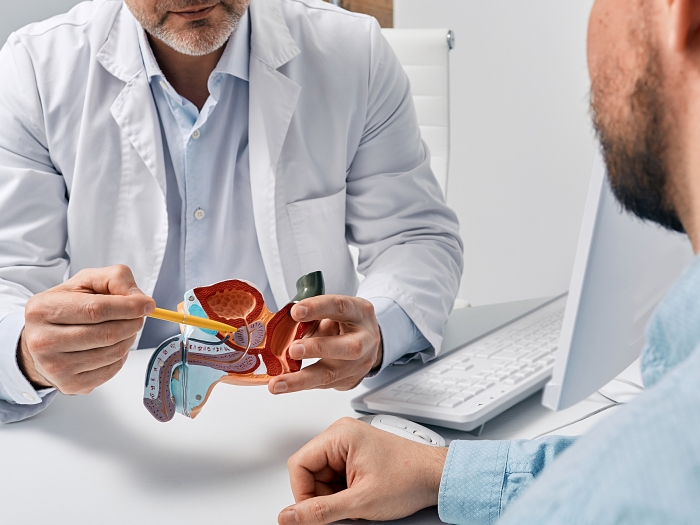Researchers look into a drug called proxalutamide as a potential therapeutic for the coronavirus
5:00 AM
Author |

Want to listen to this article instead? Check out this episode on Health Lab's podcast. And check out the Health Lab podcast page and subscribe to listen on Apple Podcasts, Google Podcasts, Stitcher or wherever you listen to podcasts.
At the outset of the COVID pandemic, men appeared to suffer higher rates of severe illness and death, leading researchers to suspect a link between androgen receptors—which bind to hormones like testosterone—and SARS-CoV-2 viral infection.
This observation spurred Michigan Medicine researchers to look into a drug in development to treat prostate cancer called proxalutamide, which works by blocking an enzyme called TMPRSS2 (transmembrane protease, serine 2) that is regulated by androgen receptors, as a potential therapeutic for COVID.
“We were already studying TMPRSS2 as part of the key gene driver of over 50 percent of prostate cancer, so it made sense to look at it as TMPRSS2 is an important host factor for SARS-CoV2 to enter cells in the lung,” said Arul Chinnaiyan, M.D., Ph.D., director of the Michigan Center for Translational Pathology and the S.P. Hicks Endowed Professor of Pathology.
Chinnaiyan, co-principal investigator Jonathan Sexton, Ph.D., assistant professor of Internal Medicine at the University of Michigan Medical School and Assistant professor of medicinal chemistry in the College of Pharmacy and their team recently published their study in PNAS.
The team added proxalutamide to cells infected with SARS-Co-V2 to monitor its ability to block viral entry.
The compound works by binding to androgen receptors, inhibiting levels of TMPRSS2 and ACE2, and blocking infection.
What’s more, proxalutamide worked better than other prostate cancer drugs against multiple variants of SARS-CoV2 due to its ability to break down the androgen receptor.
Additionally, proxalutamide, when combined with FDA-approved COVID drug remdesivir, blocked infection by 100%.
“This discovery underscores the utility of testing existing drugs for new applications that can be rapidly evaluated in humans to shorten the timeline from discovery to clinical evaluation," said Sexton, who is also director of the U-M Center for Drug Repurposing.
Buoyed by their in vitro results, the team looked to see whether the compound could stop the so-called cytokine storm, or severe inflammatory response, caused by SARS-CoV-2 infection.
Using a mouse model, they demonstrated that the drug reduced inflammation and cell death in the lungs of mice and reduced mortality.
Said Chinnaiyan, “The thought is proxalutamide could work as a combined therapy with remdesivir, hitting the virus from multiple angles, much as combination therapy works so well for HIV infection.”
The drug is currently in phase 3 clinical trials for prostate cancer and early clinical trials for COVID.
Additional authors: Yuanyuan Qiao, Jesse W. Wotring, Yang Zheng, Charles J. Zhang, Yuping Zhang, Xia Jiang, Carla D. Pretto, Sanjana Eyunni, Abhijit Parolia, Tongchen He, Caleb Cheng, Xuhong Cao, Rui Wang, Fengyun Su, Stephanie J. Ellison, Yini Wang, Jun Qin, Honghua Yan, Qianxiang Zhou, Liandong Ma
Paper cited: “Proxalutamide reduces SARS-CoV-2 infection and associated inflammatory response,” PNAS. DOI: 10.1073/pnas.2221809120

Explore a variety of healthcare news & stories by visiting the Health Lab home page for more articles.

Department of Communication at Michigan Medicine
Want top health & research news weekly? Sign up for Health Lab’s newsletters today!





